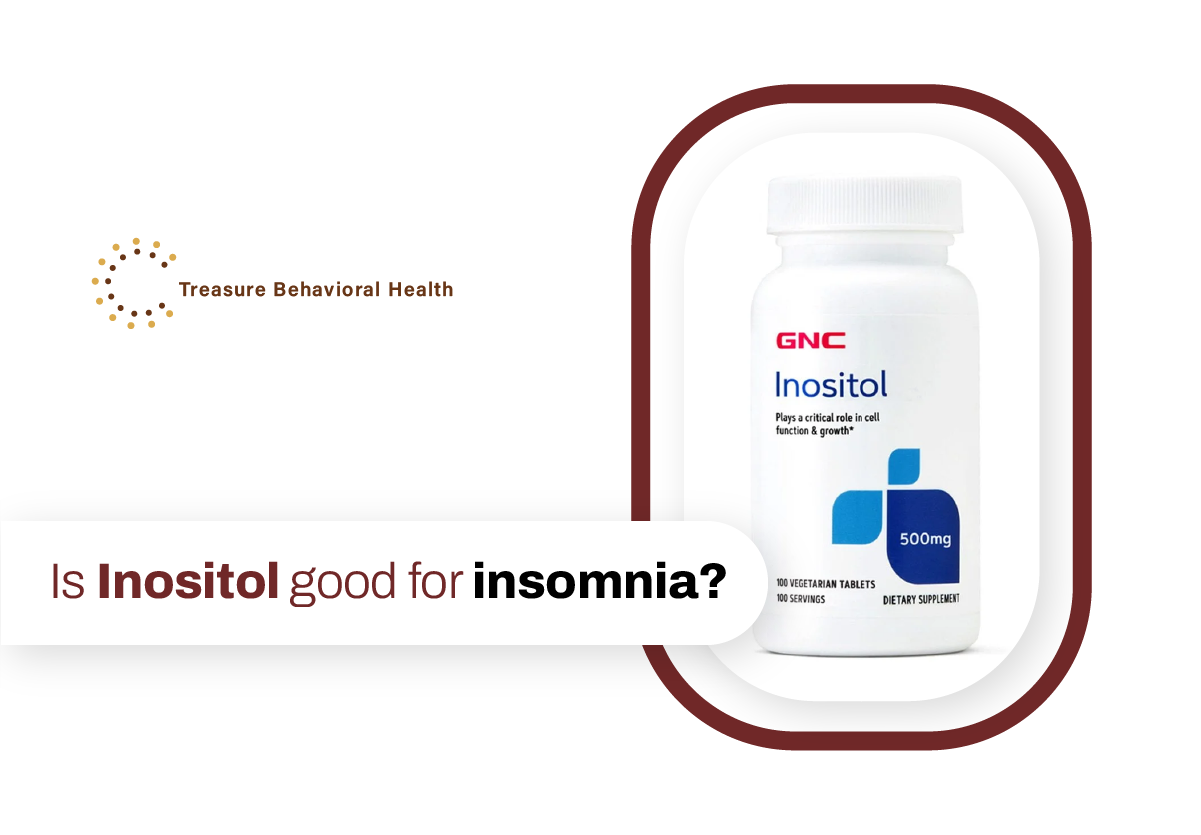Have you concern about does inositol help sleep?
Inositol, known as Vitamin B8, is naturally found in fruits, beans, grains, and nuts. Your body also makes it. This compound has a job in many body processes. For example, it helps manage essential brain chemicals like serotonin and dopamine.
Recently, people started looking at inositol as a possible help for sleep troubles. But does it work?
Let’s look into is inositol good for insomnia?
If you have a sleep disorder and need help finding relief, please get in touch with Treasure Behavioral Health today to set up an appointment.
Understanding Insomnia
Insomnia is a sleep issue where people have trouble either getting to sleep, staying asleep, or they wake up too soon and can’t get back to sleep.
They feel tired the whole day, often get easily disturbed, have trouble focusing and might face other health problems.
Insomnia can be brief (short term) or ongoing (lasting over three months). Different things can cause stress, anxiety, feeling low, lifestyle choices, or health issues.
What is Inositol?
It’s a diabetic type affecting insulin reaction and certain mood-related hormones. It is available as a supplement, and it is used to treat anxiety, depression, and PCOS. It’s a potential part of managing sleep, especially for insomnia problems.
How Does Inositol Help Sleep
-
Regulation of Neurotransmitters
This naturally occurring compound influences the making of chemicals like serotonin and dopamine. These neurotransmitters control your moods and sleep. Serotonin, notably, changes into melatonin- our sleep ‘time keeper.’ More serotonin made with help from inositol might lead to better and longer sleep.
-
Reduction of Anxiety and Stress
Sometimes, insomnia comes from stress and anxiety. Studies show that inositol can reduce anxiety. By making us less anxious, inositol might help lower the mental stress that often interferes with sleep. It makes it easier to fall asleep and stay asleep.
-
Bettering Sleep Patterns
Research indicates that inositol can modify your sleep patterns. It might contribute to healthier sleep cycles, decrease sleep interruptions, and help in a deeper, more restful sleep.
-
Helping Hormonal Equilibrium
Inositol’s potential to regulate hormones has been examined, especially in PCOS women. Hormone irregularities could disrupt sleep. So, by helping in hormone stability, inositol could indirectly enhance sleep quality.
Best Time to Take Inositol for Sleep
If you’re considering inositol for insomnia, here are some guidelines to keep in mind:
-
Dosage
Some people have concern about inositol dose for sleep.
Inositol is often sold as a powder or pill. For sleep concerns, anywhere between 500 mg and 2 grammes is standard. Healthcare providers should give you the exact amount.
-
Timing
For best results, mostly a few hours before bed. This lets inositol calm your brain and get your body ready to sleep.
-
Combination with Other Supplements
Some find that combining inositol with other natural sleep aids like magnesium, melatonin, or valerian root enhances its effectiveness. Wait to start mixing until a healthcare worker gives the all-clear.
-
Lifestyle Considerations
Remember that lifestyle matters, too. Inositol may help sleep, but habits play a big part. Make a sleep schedule, relax before bed, limit caffeine intake, and find mindfulness through yoga or meditation.
Potential Side Effects and Precautions
Inositol is typically seen as harmless if ingested in advised amounts. Yet, a few users may come across light side effects like:
- Digestive issues like nausea, gas, or diarrhea
- Headaches
- Dizziness
Some people want to know
Should I keep taking Myo inositol while pregnant?
If you’re pregnant, nursing mother, or dealing with health issues, it’s crucial to get your doctor’s advice before beginning inositol supplements. Furthermore, if you are on medication for nerves, gloominess, or other mental well-being concerns, a talk with your healthcare professional is essential to prevent any harmful mixing with your medicine.
Wrapping Up
Is Inositol good for insomnia?
Research indicates it may, but it’s still being determined. Considered for its anxiety-reducing and serotonin-boosting properties, Inositol could be helpful if anxiety or hormonal problems cause your sleeplessness.
Trying Inositol as a part of a comprehensive plan to tackle sleep trouble could be beneficial.
Yet, it’s vital to get approval from a health professional. They will confirm if it’s right for you and set the proper dosage. Combining lifestyle adjustments with potential inositol use may lead to peaceful, replenishing sleep.
FAQs
Can you take magnesium and inositol together?
Yes, inositol can mix with other natural sleep helpers like magnesium, melatonin, or valerian root, but a health professional should be asked first. They ensure the combo is safe and works well.
Are there any side effects of taking inositol for sleep?
Inositol is usually safe, but some people might notice mild side effects like stomach problems, head pains, or feeling lightheaded. It’s critical to watch how your body reacts and speak to a health professional if anything terrible happens.
Is inositol safe for everyone to use?
Most people can safely use inositol. But women who are pregnant or nursing, people with health problems, and those on some medications should ask a health professional before they start the inositol supplement.
Can lifestyle changes enhance the effectiveness of inositol for insomnia?
Absolutely. Pairing inositol with good sleep habits, such as a regular sleep pattern, less caffeine, and relaxing more often, makes it more effective in dealing with insomnia.
Is inositol a cure for insomnia?
Even though inositol can help sleep, it doesn’t eliminate or prevent insomnia. It’s part of a bigger plan to handle sleep problems, often along with changing daily habits and using other treatment options.
Where can I buy inositol supplements?
Many places sell inositol supplements, including health food stores, pharmacies, and websites. It’s crucial to pick good-quality supplements and speak to a health professional before starting a fresh supplement routine.


No comment